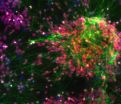(Press-News.org) ST. PAUL, Minn. – Treating high blood pressure, high cholesterol, diabetes and other vascular risk factors may help lower the risk of Alzheimer's disease in people who already show signs of declining thinking skills or memory problems. The research is published in the April 13, 2011, online issue of Neurology®, the medical journal of the American Academy of Neurology.
Researchers followed 837 people with mild cognitive impairment, the stage of memory loss that often leads to Alzheimer's disease. Of the group, 414 had at least one vascular risk factor. Participants were given blood tests and a medical history questionnaire and also underwent other tests that measured blood pressure, body mass, memory and thinking skills.
Participants who had vascular risk factors were placed into three groups: those with no risk factors treated, those with some risk factors treated and those with all risk factors treated. Treatment of risk factors included using high blood pressure medicines, insulin, cholesterol-lowering drugs and diet control. Smoking and drinking were considered treated if the person stopped smoking or drinking at the start of the study.
After five years, 298 people developed Alzheimer's disease. The others still had mild cognitive impairment. People with risk factors such as high blood pressure, diabetes, cerebrovascular disease and high cholesterol were two times more likely to develop Alzheimer's disease than those without vascular risk factors. A total of 52 percent of those with risk factors developed Alzheimer's disease, compared to 36 percent of those with no risk factors.
Of those with vascular risk factors, people who were receiving full treatment were 39 percent less likely to develop Alzheimer's disease than those receiving no treatment. Those receiving some treatments were 26 percent less likely to develop the disease compared to people who did not receive any treatment.
"Although this was not a controlled trial, patients who were treated for their high blood pressure, high cholesterol, heart disease and diabetes had less progression of their memory or thinking impairment and were less likely to develop dementia," said study author Yan-Jiang Wang, MD, PhD, with the Third Military Medical University in Chongqing, China.
###
The study was supported by a grant from the Science and Technology Committee of Chongqing, China.
The American Academy of Neurology, an association of more than 24,000 neurologists and neuroscience professionals, is dedicated to promoting the highest quality patient-centered neurologic care. A neurologist is a doctor with specialized training in diagnosing, treating and managing disorders of the brain and nervous system such as Alzheimer's disease, stroke, migraine, multiple sclerosis, brain injury, Parkinson's disease and epilepsy.
For more information about the American Academy of Neurology, visit http://www.aan.com.
VIDEO: http://www.youtube.com/AANChannel
TEXT: http://www.aan.com/press
TWEETS: http://www.twitter.com/AANPublic
Treating high blood pressure, cholesterol, diabetes may lower risk of Alzheimer's disease
2011-04-14
ELSE PRESS RELEASES FROM THIS DATE:
Why does brain development diverge from normal in autism spectrum disorders?
2011-04-14
Rett syndrome, a neurodevelopmental disorder on the autism spectrum, is marked by relatively normal development in infancy followed by a loss of loss of cognitive, social and language skills starting at 12 to 18 months of age. It is increasingly seen as a disorder of synapses, the connections between neurons that together form brain circuits. What hasn't been clear is why children start out developing normally, only to become progressively abnormal. New research from Children's Hospital Boston, published in the April 14 issue of Neuron, helps unravel what's going on.
The ...
Short-term, high-fat consumption may be beneficial to the heart
2011-04-14
WASHINGTON – Approximately one million Americans suffer a heart attack each year of which some 400,000 attacks are fatal. A key cause of heart attacks is atherosclerosis, a process in which cholesterol builds up in the arteries and impedes the ability of the blood to flow to our most vital organ. Atherosclerosis is often associated with a high-fat diet in humans, but in a new study using an animal model researchers have found that a high-fat diet for a very short period can protect the heart from heart attacks and result in less tissue damage when heart attacks occur. ...
Aerobic exercise may improve nonalcoholic fatty liver disease
2011-04-14
WASHINGTON – Walking on a treadmill for one hour a day may slow the progression of nonalcoholic fatty liver disease in obese people with prediabetes by jump-starting their metabolism and slowing the oxidative damage wrought by the condition, say researchers at the Cleveland Clinic. A study of 15 obese people with nonalcoholic fatty liver disease revealed that the daily walks not only increase insulin sensitivity, but improve the liver's polyunsaturated lipid index (PUI), which is thought to be a marker of liver health.
The improvements are linked to an increase in the ...
Short-term, high-fat diet may initiate protection during heart attack
2011-04-14
CINCINNATI—A new study from researchers at the University of Cincinnati (UC) shows that short-term, high-fat "splurges" within one's diet could elicit cardioprotective properties during a heart attack.
These findings are being presented for the first time at the 2011 Experimental Biology Meeting sponsored by the American Society for Pharmacology and Experimental Therapeutics on April 13 in Washington, D.C.
Lauren Haar, a doctoral student in the Systems Biology and Physiology Graduate Program, found that short-term, high-fat feeding in animal models led to cardioprotection ...
Older adults doing better than younger when it comes to phytonutrient consumption in daily diet
2011-04-14
GRAND RAPIDS, MICH., April 13, 2011 – Although only one in 10 American adults eats enough fruits and vegetables (1), new research being presented at the Experimental Biology meeting this week in Washington, D.C., finds older adults are consuming higher levels of carotenoids, flavonoids and other phytonutrients found in fruits and vegetables that are thought to support healthy aging. Specifically, the new findings suggest that, calorie for calorie, intakes of carotenoids are 20 percent higher, flavonoids 40 percent higher, and ellagic acid is 80 percent higher among older ...
Challenges in stemming the spread of resistant bacteria in intensive care
2011-04-14
ROCHESTER, Minn. -- A new research study of the effect of a commonly used strategy to reduce the spread of antibiotic-resistant bacteria in hospital intensive care units (ICU) shows that the strategy had no significant effect. That's the surprising finding of a multisite study led by Mayo Clinic investigators. The bacteria -- methicillin-resistant Staphylococcus aureus (MRSA) and vancomycin-resistant enterococcus (VRE) -- are resistant to common antibiotics and harder to treat if patients become infected. The findings appear in today's New England Journal of Medicine (http://www.nejm.org/).
The ...
Scientists recreate brain cells from skin cells to study schizophrenia safely
2011-04-14
A team of scientists at Penn State University, the Salk Institute for Biological Studies, and other institutions have developed a method for recreating a schizophrenic patient's own brain cells, which then can be studied safely and effectively in a Petri dish. The method brings researchers a step closer to understanding the biological underpinnings of schizophrenia. The method also is expected to be used to study other mysterious diseases such as autism and bipolar disorder, and the researchers hope that it will open the door to personalized medicine -- customized treatments ...
Patients' own cells yield new insights into the biology of schizophrenia
2011-04-14
LA JOLLA, CA- After a century of studying the causes of schizophrenia-the most persistent disabling condition among adults-the cause of the disorder remains unknown. Now induced pluripotent stem cells (iPSCs) generated from schizophrenic patients have brought researchers from the Salk Institute for Biological Studies a step closer to a fundamental understanding of the biological underpinnings of the disease.
In their study, published in the April 13, 2011 advance online issue of the journal Nature, the Salk team reports both that neurons generated from these patient-derived ...
UCSF neurosurgeons test new device for placing brain implants
2011-04-14
A new MRI device that guides surgeons as they implant electrodes into the brains of people with Parkinson's disease and other neurological disorders could change the way this surgery, called deep brain stimulation, is performed at medical centers across the country, according to a group of doctors at University of California, San Francisco.
Deep brain stimulation can help to alleviate patients' symptoms, and the new device will make the procedure faster and more comfortable for the patient. It grew out of a home-grown technique developed by a team of UCSF neurosurgeons ...
Celestial fireworks from dying stars
2011-04-14
NGC 3582 is part of a large star-forming region in the Milky Way, called RCW 57. It lies close to the central plane of the Milky Way in the southern constellation of Carina (The Keel of Jason's ship, the Argo). John Herschel first saw this complex region of glowing gas and dark dust clouds in 1834, during his stay in South Africa.
Some of the stars forming in regions like NGC 3582 are much heavier than the Sun. These monster stars emit energy at prodigious rates and have very short lives that end in explosions as supernovae. The material ejected from these dramatic events ...


